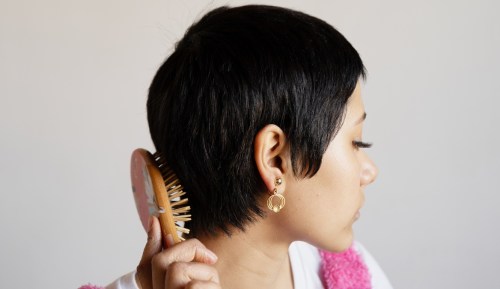Every morning, when I’m greeted with the task of shaving my legs, I wish like hell for a solution that’s more permanent. Despite the fact that I know laser hair removal is far-and-away the most lasting option, I’ve never saddled up to try it out for a few reasons: One, I’m a little worried about the pain; two it’s certainly the most expensive option out there, and three, how long does laser hair removal last, anyways? Because, if I’m going to invest the time and money, I want the hair to be gone for-e-ver.
Experts in This Article
board-certified dermatologist with Laser &
aesthetic nurse practitioner and founder of Nicole Frontera Beauty
co-founder of Glo Spa
How does laser hair removal work?
“Laser hair removal uses pulses of light to destroy the hair down to the root,” says Saime Demirovic, co-founder of Glo Spa in New York City. It does this by targeting and destroying the pigment in the hair follicle. “These laser-light pulses create heat which damages the hair follicle until it is permanently destroyed.” (More on that later). “You’re exposing the targeted hair follicle to a high energy beam of light without injuring the surrounding skin structures,” says Leonard Bernstein, MD, board-certified dermatologist with the Laser & Skin Surgery Center of New York. As for what to know about the treatment itself and how long it lasts, keep on reading for all the intel to have before you book your first appointment.
Although it has been around since the mid-’90s, Dr. Bernstein says it’s advanced a lot since then. At his facility, he uses devices like the Clarity II by Lutronic, which he says has many bells and whistles that make it customizable for different people who comes to his office. “Many lasers and Intense Pulse Light (IPL) devices have developed over the past decades, making the elimination of hair a very safe process when performed by well-trained and experienced laser physicians,” he says.
What factors can affect it?
To figure out which laser to use on a patient, Dr. Bernstein takes into account factors such as skin tone, hair color, hair coarseness, tattoos, and past use of certain medications.
Advancements in laser technology have made it much safer for darker skin tones, which hasn’t always been the case. “When laser hair removal first came on the scene, the machines used were IPL lasers and were not designed to treat darker skin tones,” says Demirovic. That’s because the lasers weren’t able to differentiate between the melanin in the hair follicle and the melanin in the skin. This meant that those with melanin-rich skin were at an increased risk of experiencing burns, scarring, hypopigmentation (light spots on your skin), and other reactions when treated with a laser. ”
But now, we have options. “We have two different wavelengths for laser hair removal,” says Nicole Frontera, an aesthetic nurse practitioner and founder of Nicole Frontera Beauty medspa. “One is for lighter, more fine hair, which is the 775 Alexandrite laser, and the other is 1064 or YAG laser, used for darker hair and skin types.” The Nd:YAG laser operates at a longer wavelength (1064 nm). Alexandrite lasers, by contrast, have shorter wavelengths (820 nm).
What are some laser hair removal contraindications?
Frontera says you shouldn’t be pregnant to have the treatment done.
“Basically, we don’t do anything on pregnant women,” says Frontera. “In theory, the laser wouldn’t penetrate the skin to cause any trouble, but we don’t want to chance it. If someone got laser hair removal and they didn’t know they were pregnant, it wouldn’t be a major cause for concern, but it’s not something we’d do knowingly.”
You must also be off of antibiotics (both topical and oral), for at least one to two weeks before starting laser because otherwise you’ll be extra sensitive to light and can be burned. Retinol and laser hair removal don’t mix well, either, which is why you should not use retinoids for three to five days before the treatment. Keep in mind that if you’re about a week away from starting your period, your skin can be extra sensitive, so you might want to schedule around that for pain’s sake.
When doesn’t laser hair removal work?
Because it works by seeking out the darker pigment in the hair follicle than in the skin itself, laser hair removal only works on hair that’s darker than the skin tone itself (sorry, peach fuzz and chin hairs!). Redheads, blondes, and those with gray hair are also out. “They are not a candidate for laser hair removal because they don’t have pigment in their hair, and the laser needs pigment to carry the heat down to the follicle,” says Frontera. “Brunettes or darker brown hair are best. Light brown isn’t as good. The best candidates are dark hair with light skin.”
How should you prep for your appointment?
When you first go for an appointment, Dr. Bernstein says to have a bit of your natural hair grown out on the surface of your skin so that the technician can better evaluate the density, quality, and color of your hair. Following that appointment, you’ll want to remove hair prior to visiting your technician. “If there is hair on the surface, the laser will waste its energy burning the hair and won’t be able to reach the root to effectively kill the hair,” says Demirovic.
How long does laser hair removal last?
Wondering if laser hair removal is permanent? The short answer is no. “All of the studies that have been done show it’s not actually permanent, but what you’ll see is its long-term hair removal,” says Frontera. However, Dr. Bernstein says that it’ll grow back finer and less coarse than what you had before. “We also expect to see a reduction in the density or numbers of active hairs in the treated area,” he says.
Beyond timing, it can also depend on where on the body you’re getting the treatment done. “Areas that respond best are underarms and the bikini area,” says Frontera. “Because in general, even if you have lighter skin, those areas will have darker, more coarse hair, which makes those lasers more efficient. Arms or upper thighs, where hair is finer, may grow back or not respond 100 percent to the lasers.” And since coarser hair responds best, men may see better results than women, as they tend to have coarser hair.
That said, other factors can influence how long laser hair removal lasts. “That would include the energy levels used, the expertise of the laser physician, and underlying conditions of the skin,” says Dr. Bernstein. Hormones can also play a role.
“As we change hormonally, hair can regrow,” says Frontera. “If someone gets pregnant, they may need another session or a touch-up session after they have children. Other hormonal changes like polycystic-ovary syndrome (PCOS) can cause hair growth on the face or grow hair out of nowhere. Some people can go on and off birth control with little to no effect, but for some people, it may cause a larger shift that will cause hair growth.”
Laser hair removal is not a one-and-done sort of deal. After you’re finished receiving all of your sessions, laser hair removal will last for two to six years. However, maintenance sessions one to four times a year may be needed to keep the area hairless forever.
General laser hair removal FAQs
Why does laser hair removal take multiple sessions?
“The theory on laser hair removal is that each session will damage approximately 20 percent of your hair follicles, so eventually you’ll get to 100 percent,” says Frontera. “That’s why most salons sell treatments in packages. We do it in a series of eight because it’s easier that way.”
How long should one wait between laser hair removal sessions?
“It depends on the area of the body,” says Frontera. “Usually. I say for weeks for the face, four to six weeks for the midsection, and six to eight weeks for the legs and bikini area.”
Are there any side effects of laser hair removal?
“Some people get a localized skin reaction that looks almost like goosebumps, which is normal,” says Frontera. “Sometimes it swells for a day or two, or there may be some redness. The area may feel warm shortly after the treatment. Otherwise, typically no.”
Does laser hair removal cause any sort of damage to your skin?
“It could if the settings on the laser aren’t correct,” says Frontera. “If someone uses too high of energy, you could hypo- or hyper-pigment the skin so you have to be very careful. You could also burn the skin if the energy is too high and cause a blister. It’s important to go to someone who’s well-trained.”
How long does it take laser hair removal to work?
“It depends on the person, but I usually tell people by the second or third session, they’ll see less hair,” says Frontera. “Some people will see thinner hair after the very first session if it’s really thick, coarse, dark hair—but most people won’t notice anything they can really see until after two or three.”
How safe is laser hair removal? Is it better than waxing?
“It’s extremely safe,” says Frontera. “Other than the minor side effects mentioned if being treated too high, it’s completely safe. I haven’t seen anything over the years I would be concerned with. I think it’s better than waxing, but not everyone can do it because of their hair color. If you can do laser hair removal, absolutely do it.”
Do at-home permanent laser hair removal solutions work?
“I’ve never seen an at-home hair removal device that works, but I haven’t tried it myself,” says Frontera.
How much does laser hair removal cost?
This depends on how large of an area you’re getting done, the expertise of the person performing the treatment, where they’re office is located, and more. Typically, the cost can range between $100 and $800 a session. According to the American Society of Plastic Surgeons, the average cost of laser hair removal in 2020 was $389.
Sign Up for Our Daily Newsletter
Get all the latest in wellness, trends, food, fitness, beauty, and more delivered right to your inbox.
Got it, you've been added to our email list.











